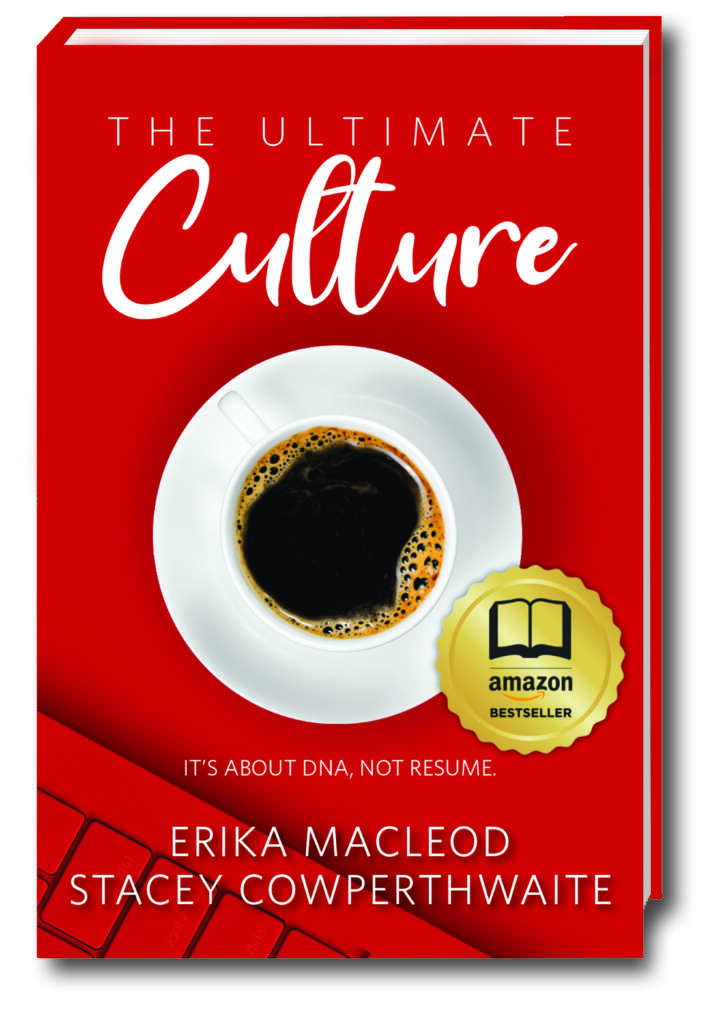
With Erika MacLeod and Stacey Cowperthwaite
Congratulations to coauthors Erika MacLeod and Stacey Cowperthwaite for reaching Amazon best-seller status with a comprehensive debut and nonfiction narrative, The Ultimate Culture: It’s about DNA, not Resumé. For those who haven’t had a chance to pick it up, The Ultimate Culture details the life, times, and development of the refined Tulip Media culture, which is furthered by applying these cultural concepts to other organizations on a large scale. These two incredible women have put together something timeless in terms of culture, and you’ll find this book has a valuable takeaway for everyone.
I’m excited to speak with these two engaging new thought leaders about their take on the writing process and what the conceptual development of this book looked like for them from start to finish.
Tell me about the process of writing the book. What was the overall experience like for you?
Stacey: When we decided to do this book, it was a bit overwhelming. As we dove in and started to work on the book, things came together quite quickly as we have so much history and memories together. This goes back to our philosophy of jumping out of the plane and building the parachute on the way down. We always figure it out!
Erika: It was an amazing experience and a great opportunity to take a trip down memory lane. It reminded me just how much of our Tulip Media culture we often take for granted. There were many “aha!” moments when Stacey and I realized just how fortunate we are to work in the environment that we do.
The Ultimate Culture really uses experience to reflect on what you’ve portrayed here as the ultimate culture. Looking back, what were some of your favorite memories to revisit?
Stacey: I really enjoyed looking back to the early days when it was just Andy and me in the office. We knew what we wanted but not how it would transpire. We had a mutual purpose of building the company into what it is today. It has been great to revisit these memories and our successes and failures, and that is what business is about.
The culture of learning in Tulip Media really shines through. Can you talk a little bit more about your own experiences furthering your company role through education? What did this look like and how were you supported?
Erika: I fully appreciate how fortunate I am to utilize some of the connections that we have to take part in so many of the events that Tulip Media attends. There are so many people whose books I have read and whom I follow online, and these summits have given me the opportunity to actually meet them in person.
Some of these events have a $25,000 attendance fee, and I’ve been given the opportunity to go all over North America to sit in on some of these events with truly amazing speakers.
A large part of my role is coordinating our national content, which requires me to extensively research business authors. It’s not uncommon for me to spend hours researching an up-and-coming author or thought leader, so these connections are invaluable to my growth in my position here at Tulip Media.
When Andy and I attend these events, we always bring back what we learned into the office and allow it to impact our culture in a way that benefits the entire company. We are always trying new things, constantly looking for better ways to communicate and to become more efficient, to name a few. Everything we do revolves around knowledge.
Very cool! Who are some of the people you’ve been able to work with because of this?
Erika: Included in those I have met is business and team management expert, Patrick Lencioni. Lencioni is best known as the author of The Five Dysfunctions of a Team, a popular business fable that explores work team dynamics and offers solutions to help teams perform better. Others include Chris Voss, a former FBI hostage negotiator, the CEO of The Black Swan Group Ltd, and coauthor of the book Never Split the Difference; Jack Daly, an international expert in sales and sales management; John DiJulius III, an authority on world-class customer service; Joe
Polish, aka, “the most connected man on the planet;” and Verne Harnish, who serves as cofounder and principal of Gazelles Growth Institute and as founder and chief executive officer of Gazelles Inc. Sometimes I’m a little starstruck!
How has what you’ve learned over the last number of years taught you about what company culture looks like in any organization?
Stacey: Walking into a business today, I can almost immediately feel the culture within that building. I think we’ve all worked for organizations with poor culture, but when you move into an organization like Tulip Media, you quickly learn what good culture is and the importance of its role. I hope this book helps companies transform their culture not only for the health of their employees but for the health of their businesses.
What have all of the experiences and learning you’ve accumulated in the last number of years taught you about the role and importance of culture in any organization?
Erika: This goes back to the thought leaders and national contributors that we work with. Because of our constant exposure to the best of the best, we are very in tune with what people are doing and new ways of thinking. Andy always reminds us that if we can take one thing from each book we read that even remotely changes our day-to-day, then we’ve gotten incredible value from that book. It’s wonderful to know Andy is still encouraging and investing in my education long after I’ve graduated university.
How do you know when you walk into a store if that store has a primarily positive or negative culture? What do you look for?
Erika: If, say, two salespeople were talking and laughing before I even walked in, right away I would think it was a pretty cool atmosphere. If they looked over and acknowledged me with a truly genuine and friendly demeanor, that would be amazing. On the flipside, heads down, completely disengaged with a forced greeting would make it immediately obvious they weren’t very happy with their job, which would signify a cultural disconnect.
Hiring people that you trust is important. Having someone that truly does understand the job is a must, but letting their personality shine through also enriches any position. It’s not about resumé, it’s about DNA.
Can you share some of your thoughts and philosophies about business success in the world at large?
Stacey: In the past, I worked as owner and manager of a brand champion restaurant, which means that ours was one of the top 10 performing restaurants in the chain. This did not come easily. It required hard work to maintain a happy staff that came to work and did their best every day. They’d go home feeling like they’d made a difference. In turn, that happy staff made a difference in our business. We owe it to them.
That being said, I think culture starts at the top and finds its way down through strong leadership.
Erika: At this moment, a lot of things are still unknown. Everyone is adapting and moving forward, waiting to see how this new normal plays out.
One thing we do know, because we’ve experienced it ourselves, is that there is going to be a lot more remote work and a lot less travel going forward. Everything is going to be done more independently and in a digitally interactive fashion.
Not everyone finds it easy to work from home. Social people like me who crave the office atmosphere are adjusting to work-at-home life. I would say the biggest factor for our own success has been being open, flexible, and understanding.
Wow, thanks so much for speaking with me today! I really look forward to hearing from you both again very soon!

